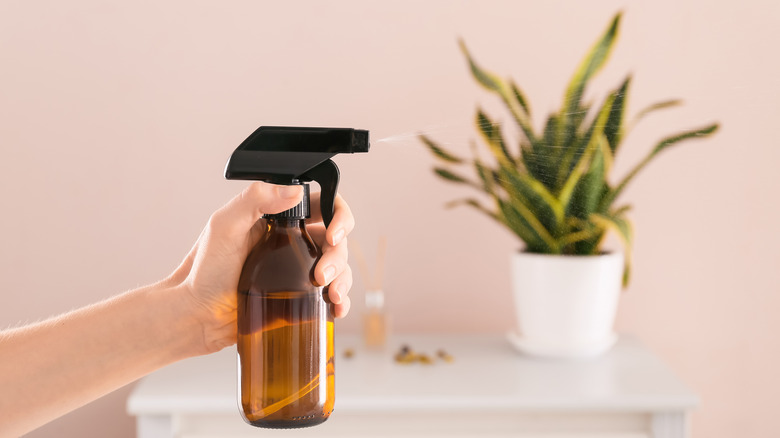Remove Fishy Or Fried Food Smells With Two Common Kitchen Ingredients
So your house smells again. Maybe you fried up too many pickles in canola oil, poached fresh cod in butter, or in an unholy odorous alliance, actually fried up some fish and chips. While the meal may have been delicious, the smells left behind may have you wondering if cooking fish or frying food in oil is ever actually worth it. And after you've given the area a pass over with all of the air fresheners, essential oils, and scented candles, it may feel like burning the place down is your only choice. But luckily, you just need a few kitchen ingredients to save the day: cinnamon and white vinegar.
White vinegar is one of those super-ingredients that seems to be able to do it all, and it sort of is. It can remove hard water, disinfect surfaces, and yes, help your home to no longer smell like a fish market. Vinegar is highly acidic, so by releasing it into the air, it is able to neutralize alkaline scent-carrying particles. But you don't want to use vinegar on its own, because while it might help to neutralize some odors, it has its own less-than-pleasant aroma that might make your house smell like a pickle jar. That's where the cinnamon comes in. By simmering both vinegar and cinnamon sticks in a pot of water, you both dissolve nasty food odors and leave your home with a cozy, inviting smell.
Steam out the smells
One of the best ways to effectively use the vinegar-cinnamon combo is to heat the mixture on the stovetop with some water. If you've ever made a simmer pot, also known as stovetop potpourri, you probably already know the drill. Add a few cups of water, 5 to 6 tablespoons of white distilled vinegar, and a few cinnamon sticks to a medium saucepan. Bring the mixture up to a boil, then reduce the heat until it just simmers. The steam should distribute the vinegar and cinnamon aroma throughout the room.
There's no real time limit on how long you can let the pot simmer, but be sure to top it off with water since the steam causes evaporation — otherwise, you'll end up with a burnt cinnamon-coated pan. If you're nervous about leaving your stovetop on for any extended period of time, you can easily mix vinegar, water, and cinnamon in your slow cooker. Just set the slow cooker to low heat and top off with water as needed. Once the odors have been neutralized, just pour the water down the drain, taking care to strain solids out if you used whole cinnamon sticks.
Cinnamon and vinegar tips and tricks
We recommend using whole cinnamon sticks because they tend to have more of the spice's fragrance and potency, but they can be expensive. Be sure to check out the spices available at an ethnic food market, as they are usually sold in bulk at much more affordable prices. However, if you're in a pinch, you can use ground cinnamon or cinnamon bark essential oil. You'll want to use distilled white vinegar because it doesn't have additional odors like red wine or balsamic vinegar might. Apple cider vinegar would also work well, and might even complement the cinnamon scent.
Want an on-hand solution for the next fried fish night? Try simmering cinnamon, vinegar, and water in a pot for a few minutes, straining the liquid mixture, letting it cool, and adding it to a spray bottle. Now, you have the same odor-fighting properties in a spray bottle that you can spritz on upholstery, kitchen curtains, and more. Just be sure to test the solution on a small, hidden area before applying widely in case of discoloration.


